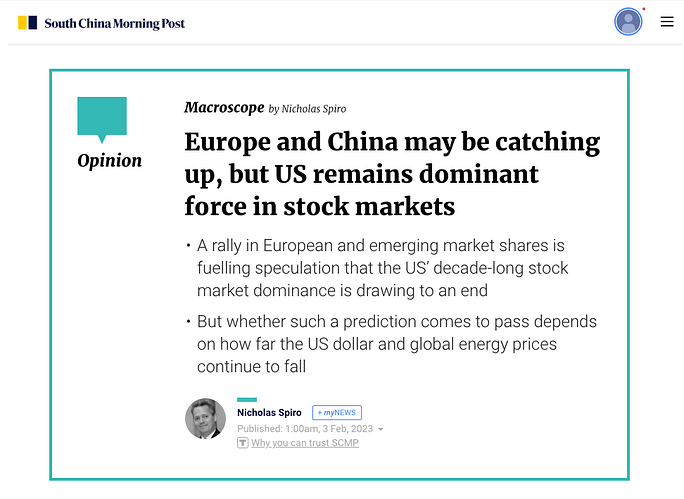-
自2009年以来,标准普尔500指数已经上涨了502%,而富时全球(美国除外)指数仅上涨了118%。
-
自2008年以来,美元已经飙升了33%,这对 "美国优先 "贸易的成功起到了推动作用。
-
美国的超额表现是由于多种因素的结合,包括美元的强势。
-
美元走强增加了其他国家的偿债成本和紧缩的金融条件,因为一半的跨境贷款和国际债券是以美元计价的。- 新兴市场的私营企业部门以美元计价的债务水平特别高。- 2011-12年的欧元区债务危机,2015年中国股市泡沫破裂,以及2020-21年北京的监管打压,都对欧洲和发展中经济体的情绪产生了负面影响。- 国际货币基金组织对这些因素带来的潜在风险提出了警告,特别是对那些以美元计价的高额债务国家。
-
以标普500指数为代表的美股,自10月中旬以来一直被欧洲和新兴市场的表现所超越。
-
标准普尔500指数的涨势是由科技巨头亚马逊、苹果、Alphabet、微软和Meta平台的权重推动的,在2020年9月达到了24%的历史高点。
-
自10月中旬以来,富时全球(美国除外)指数上涨了25%,而标准普尔500指数的涨幅为15%。
-
科技含量高的美国股票市场从大流行中受益匪浅,但现在被其他市场超越了。
-
美国银行的全球基金经理调查发现,投资者已经将他们对美国股票的配置减少到17年来的最低水平。
-
相反,投资者增加了对新兴市场和欧洲的投资,在这两个地区都采取了超额的立场。
-
这种增加对新兴市场和欧洲投资的趋势导致人们猜测,在美国十年的主导地位之后,股票市场的区域领导权的接力棒正在从美国传递到世界其他地区。
-
全球股市正受益于美元的疲软。
-
自9月下旬以来,美元已经下跌了10%,主要是由于美联储的加息运动。
-
这对新兴市场是一个福音,欧元也出现了显著的复苏。
-
美元的这种疲软一直是全球股市前景看好的一个关键因素。
-
自9月底以来,欧元已经上涨了14.5%,这主要是由于更便宜的能源和一个更温和的冬天。
-
欧元区的经济在去年最后一个季度有所增长,无视人们对经济深度衰退的预测。
-
中国经济的迅速复苏打消了人们对全球经济衰退的担忧,并导致股票市场从美国转向新兴市场和欧洲。
-
美国银行的基金经理调查显示,对中国经济增长的预期已经飙升至17年的高点。综上所述,由于一些因素,欧元在最近几个月出现了大幅上涨。更便宜的能源和更温和的冬季天气发挥了作用,欧元区经济的意外增长也是如此。中国经济的迅速重新开放也对欧元产生了积极影响,导致股市的轮动和对中国经济增长的预期增加。
-
由于技术溃败和欧洲及新兴市场更便宜的估值,美国股市受到了压力。
-
欧洲和新兴市场要想成功,美元必须持续走弱,天然气价格需要下降,而投资者需要容忍风险。
-
这些风险包括高杠杆率和有问题的公司治理,最近阿达尼企业因被指控会计欺诈和操纵股票而导致24亿美元的股票销售脱轨就是证明。
-
最近的一项撤消发行的决定有可能加剧人们对阿达尼上市公司集团的信心丧失,这些公司是印度股市壮观涨势的主要推动力。
-
长期以来,印度股票的高估值一直是一个令人担忧的根源。
-
股市中的 "美国优先 "交易已经解体,欧洲和新兴市场的表现已经开始超过美国。
-
然而,在未来几年内取代美国成为股市的主导力量,看起来仍然是一个不可逾越的挑战。
-
The S&P 500 index has risen 502% since 2009, while the FTSE All-World ex US index has risen just 118%.
-
The US dollar has surged 33% since 2008, which has contributed to the success of the “America first” trade.
-
The US outperformance is due to a combination of factors, including the strength of the US dollar.
-
A stronger US dollar has increased debt servicing costs and tighter financial conditions for other countries, as half of all cross-border loans and international bonds are denominated in dollars.
-
Emerging markets have particularly high levels of dollar-denominated debt in the private corporate sector.
-
The euro-zone debt crisis of 2011-12, the bursting of China’s stock market bubble in 2015, and Beijing’s regulatory crackdowns in 2020-21 have all had a negative impact on sentiment towards Europe and developing economies.
-
The IMF has warned of the potential risks associated with these factors, particularly for countries with high levels of dollar-denominated debt.
-
US stocks, as represented by the S&P 500, have been outperformed by European and emerging markets since mid-October.
-
The S&P 500’s rally was driven by the weighting of tech giants Amazon, Apple, Alphabet, Microsoft and Meta Platforms, reaching a record high of 24% in September 2020.
-
The FTSE All-World ex US index has risen 25% since mid-October, compared to 15% for the S&P 500.
-
The tech-heavy US equities market has benefited greatly from the pandemic, but is now being outperformed by other markets.
-
The Bank of America’s global fund manager survey found that investors have reduced their allocations to US stocks to the lowest level in 17 years.
-
Instead, investors have increased their exposure to emerging markets and Europe, taking an overweight position in both regions.
-
This trend of increased investment in emerging markets and Europe has led to speculation that the baton of regional leadership in stock markets is being passed from the US to the rest of the world after a decade of US dominance.
-
Global stocks are benefiting from the weakening of the US dollar.
-
The dollar has dropped 10% since late September, largely due to the Federal Reserve’s rate-hiking campaign.
-
This has been a boon for emerging markets, and the euro has also seen a remarkable recovery.
-
This weakening of the dollar has been a key factor in the positive outlook for global stocks.
-
The euro has risen 14.5% since late September, largely due to cheaper energy and a milder winter.
-
The euro-zone economy grew in the final quarter of last year, defying predictions of a deep recession.
-
The rapid reopening of the Chinese economy has allayed fears of a global recession and caused a rotation in stock markets out of the US and into emerging markets and Europe.
-
Bank of America’s fund manager survey revealed that expectations for Chinese growth have surged to a 17-year high. In summary, the euro has seen a significant rise in recent months due to a number of factors. Cheaper energy and milder winter weather have played a role, as has the euro-zone economy’s unexpected growth. The rapid reopening of the Chinese economy has also had a positive impact on the euro, leading to a rotation in stock markets and increased expectations for Chinese growth.
-
US stocks have been put under pressure due to tech rout and cheaper valuations in Europe and emerging markets.
-
For Europe and emerging markets to succeed, the dollar has to keep weakening, gas prices need to fall, and investors need to tolerate risks.
-
These risks include high leverage and questionable corporate governance, as evidenced by the recent derailment of a US$2.4 billion share sale by Adani Enterprises due to allegations of accounting fraud and stock manipulation.
-
A recent decision to pull an offering risks exacerbating a loss of confidence in the group of listed Adani companies that were a key driver of the spectacular rally in Indian stocks.
-
High valuations of Indian stocks have long been a source of concern.
-
The “America first” trade in equity markets has unravelled, and Europe and emerging markets have begun to outperform the US.
-
However, supplanting the US as the dominant force in stock markets for years to come still looks like an insurmountable challenge.
